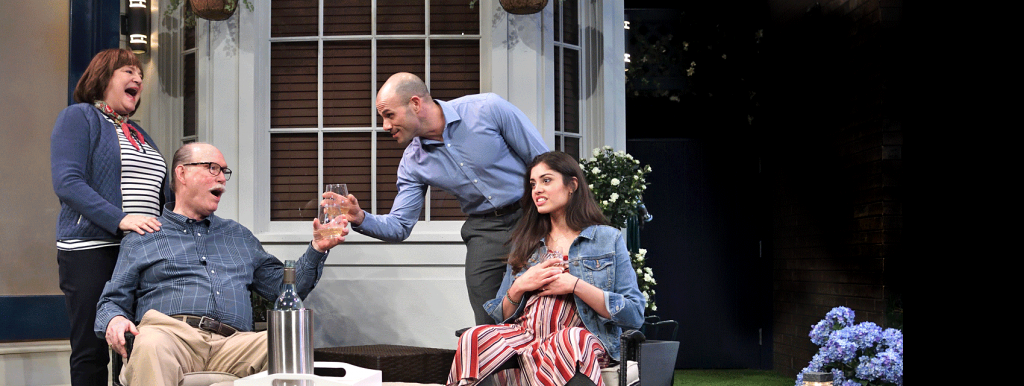The following is a transcript of highlights from a conversation in August 2023 between A Christmas Carol director Stephen Thorne and Ebenezer Scrooge actor Mauro Hantman. Stephen and Mauro have been resident company members and colleagues at Trinity Rep for more than 20 years.
Christmases Past
Stephen Thorne: My first A Christmas Carol [2000] was memorable because that was when we were still doing two casts. I had no experience with the show and was in the second cast. The first cast would do a full rehearsal period and create the show, and the second cast would have about two weeks to learn it.
At that time, the maximum number of performances in a week was up to 20. Having never done the play before, the whole process felt slightly like one of those dreams-slash-nightmares where everybody knows what’s going on except for you.
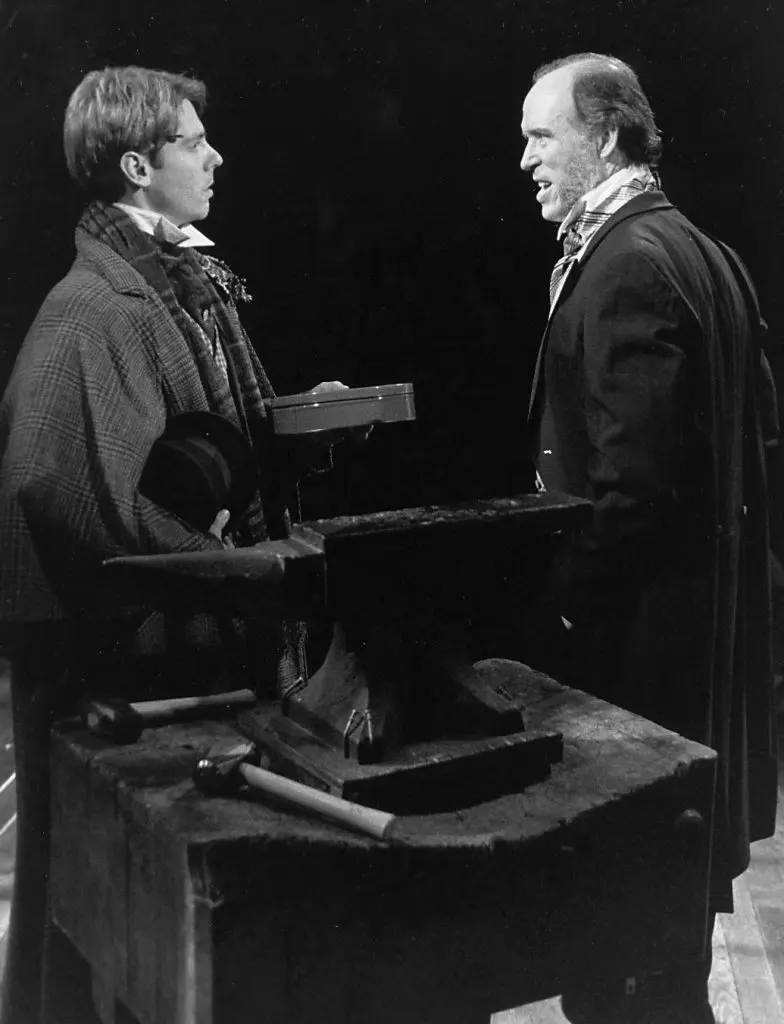
That was also directed by Kevin Moriarty, and it was quite a good one. I remember having to do a lot of stuff, including flying, for the first time.
Mauro Hantman: There was a male Scrooge and Nephew Fred in one cast, and a female Scrooge and Niece Lucy in the other. You were playing Nephew Fred, right?
ST: I was.
MH: I was playing what’s typically the “Lucy” part of Scrooge’s nephew’s/niece’s spouse … but the part was named Fred.
ST: And to make it even more confusing, [resident company member and Stephen’s wife] Angela [Brazil] was actually playing the “Nephew Fred” part of being Scrooge’s living family, but under the name “Niece Lucy.” So really Angela and I were playing the same character in different casts under different names.
MH: That year I did one of the worst things I’ve ever done in my life. This was before we had cell phones, and Steve was new to the company. I wrote the schedule for one weekend down for the wrong times! I thought that I had a 2:00 pm show and an 8:00 pm show, when I actually had an 11:00 am show and a 5:00 pm show. And I missed the 11:00 am show because I was helping my girlfriend move into a new apartment.
Somehow, they tracked me down and I got to the theater like an hour after the show started. So, Steve had to cover for me. But he had to cover the part opposite the part that he usually played. I thought that that was going to be the end of my career!
ST: Wonderfully it wasn’t and here we are!
MH: Wait, was that also the [year] with the furnace?
ST: Yeah! That year really leaned into the child labor thing Dickens was railing against. Everyone was working in this factory, and we had this huge furnace that had an actual flame in it. This was 20-something years ago, so it was a very different time. Marley came out of that like he was literally coming out of the flames of hell. It was really quite something.
MH: I’ve been in 16 Christmas Carols. My first one was directed by Amanda Dehnert [1997], but I don’t remember exactly who I played. Some people can say “in 2010 I played this part in this production and had this line,” but for me I just know I was in the company.
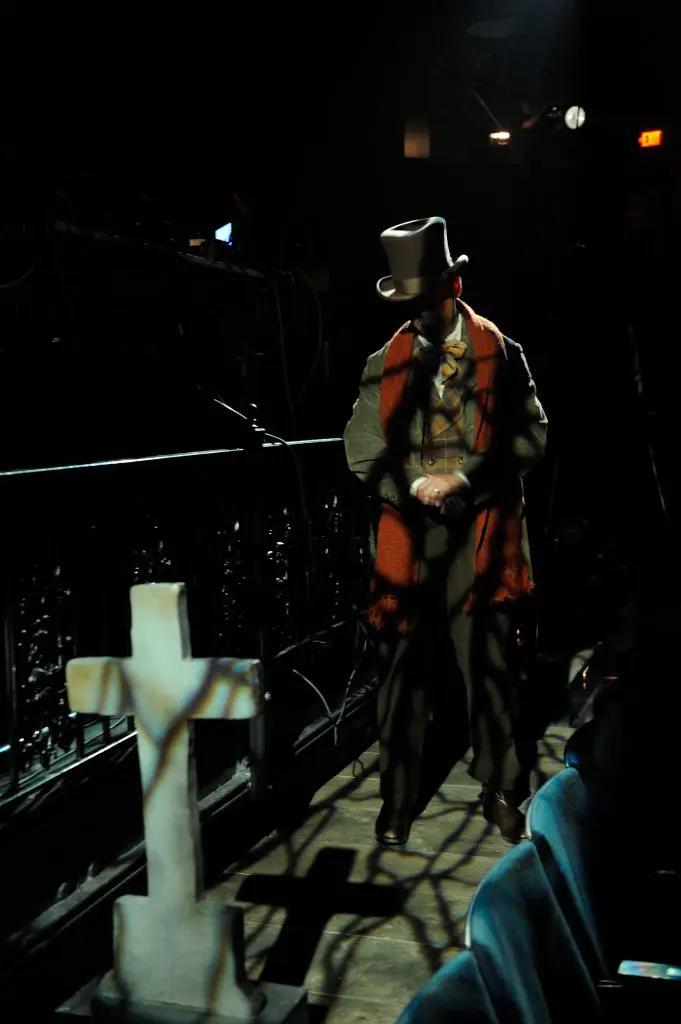
I remember snippets from each production. The last time I was Scrooge [2010], there was a delightful group of grad students in the show who spent a lot of time subtly pretending to stab each other and me onstage … Hopefully the audience couldn’t see that, but I loved it!
I’ve played Bob Cratchit a lot, but I remember one production [2012] directed by Tyler [Dobrowsky] where instead of the whole family talking about Tiny Tim at their house, he had Bob Cratchit speaking directly to Tim at his grave. I thought that was really powerful.
ST: I remember that. Usually when you get to the sad Cratchit scene, especially when we’re not doing an intermission, the kids in the audience get a little restless. That’s a good example of one of the many changes to the production year after year. Tyler turned it into this really nice monologue just done by Cratchit, very simplified.
I remember Amanda’s second one [2005] where we had snow all over the stage. Not just in the end where it falls from the sky, but the entire stage was covered in snow the whole time. It looked great, but … I found snow in my clothes for months afterward. I’d pull my hand from my pocket and snow would come out.
MH: That was the plastic snow. Now we use foam or something. How much snow are we expecting this year?
ST: A lot!
MH: The problem with the plastic snow at the end is that we’d all be singing in the finale, and you’d inhale one little flake of snow which would implant itself on your esophagus. It would happen all the time. So you’d have to just smile and mouth the words and try desperately not to cough.
ST: There will be no choking on snow this year. I’ll be on the lookout!
The Scrooge of the Present
ST: Mauro is a fabulous actor. We’ve been colleagues for 23 years now. When I first joined the company, Angela, Mauro, Rachael [Warren], Joe [Wilson, Jr.], and I were the new kids on the block. We looked up to the veteran company members who were kind of the go-to Scrooges, all thinking maybe someday we’d get there.
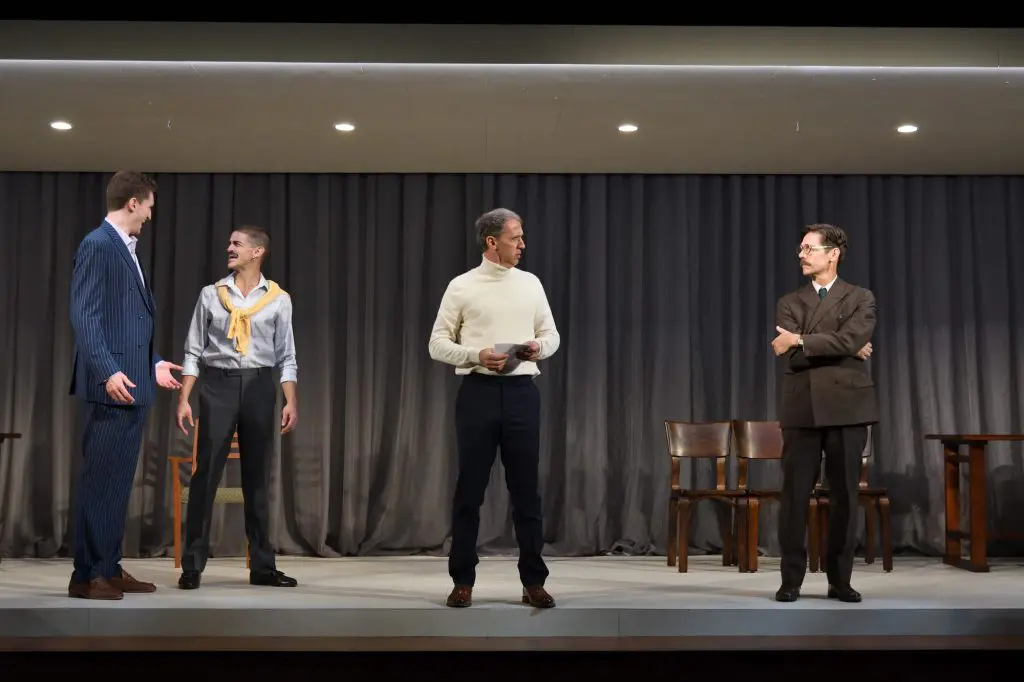
Last season, Mauro and I worked together on a show called The Inheritance. Although we had very little stage time together, we were able to watch each other perform. And I remember looking around the room and thinking, “Oh my God, we’re the oldest people in this show. We are the veterans now.”
So when I started thinking about the Scrooge I was interested in, Mauro was the first person to come to mind. Partially because he’s a mensch of a human being and actor, but also because I was interested in a Scrooge who was middle-aged. Perhaps in Dickensian London that meant ancient, but for our production, this is a Scrooge who’s at the crest of a hill that will probably just go straight down for the next 20 or 30 years of his life — he’s got a lot of life left to live — and it’s bound to get much more miserable if he stays on this path, versus a Scrooge who’s maybe 70 or 80 and has a limited amount of time. My hope was that the audience will see a little more of themselves in there.
MH: Scrooge is such a great part to play, with such a huge journey, and new things to find each time. Every director has a different take on it, so the angle this year is going to be totally unique, even if it’s my third time doing it. One of the great things about what we do at Trinity is that we’re not just bringing everything out of the box the same way each year. We reimagine this story and these characters each and every time … It’s an opportunity to dig deeper each time.
ST: We’ve been part of this incredible company that collectively carries not just this story, but this part aloft year after year. Last year, Phyllis [Kay] embodied it so, so wonderfully. And Tim [Crowe] did too the year before that, but in a totally different way. Each performance brings something completely unique.
Isolation is really on my mind this year. Scrooge is so isolated – he’s isolated himself. Every human being on the planet has such a visceral experience of isolation as a result of the pandemic. We have been changed because of it. I think that adds a different lens on how we receive what it means to not be able to connect to people. In Scrooge’s case, it’s a deliberate act. Speaking for myself, sometimes I can’t stand leaving the house anymore. I’m like, “There’s too many people, there’s traffic everywhere, I just want to get my toilet paper and go home where it’s safe and quiet.” And a part of me goes, “that’s kind of a version of Scrooge.”
What’s Yet to Come
MH: At this point, I’m just looking forward to being in the same room with all these folks, some of whom I haven’t worked with for a while, or at all until now. COVID kind of did a number on us and we had to shut down, so we’re still sort of rebuilding as a company and a culture. I feel like this is going to be going to be an awesome Trinity show with people that I love and admire.
ST: I think it’s a great cast and we’re going to have a good time in the room together. And I’m really happy with the design team we have.
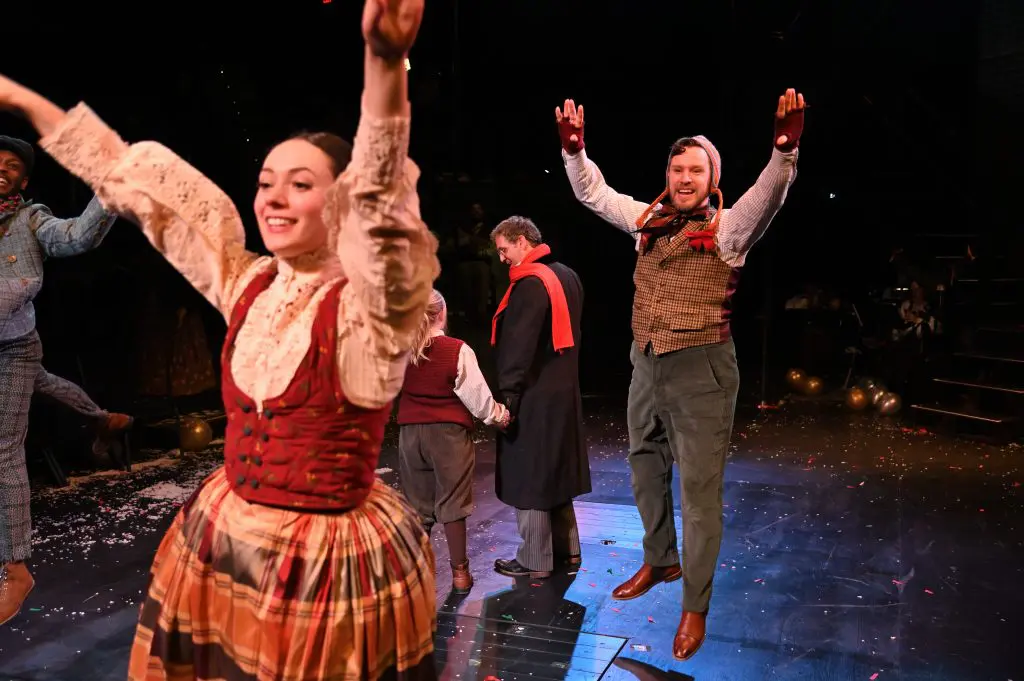
MH: Amen to that!
ST: Another thing I wanted to mention is that we’re casting neurodiverse young actors for our kids company – and thinking differently about the role of Tiny Tim. Imagining Tim as a neurodivergent child, for me, creates an opportunity to reflect our audiences’ own experiences more directly. And it offers us the opportunity to invite neurodivergent performers into our company. I wanted to explore the Cratchit family dynamic, how they make space and adapt to the needs of their child, even in a time and place that was surely unwelcoming to neurodivergence.
MH: There’s something about A Christmas Carol that people want to come back to year after year. I think it’s because people love the idea of redemption, that you can be a total jerk and isolate yourself from society, yet there’s still hope for change. Because Scrooge is the main character, the audience put themselves in his shoes. They get to say “Yep, I understand why he’s like this.”
But if you look at Shakespeare, for example, or plays that came before, the bad guys are just the bad guys. Iago doesn’t change. Macbeth is punished because he doesn’t do the right thing. But you don’t really see redemption there, just people staying the same or getting worse. I think it’s cool that A Christmas Carol has this guy who goes from being the worst person in the world to a functioning member of society who wants to do good.
ST: I totally agree. Dickens crafted this icy, profoundly broken person and lets us know that 1. This is a person and 2. He has the capacity to change. That idea is so profound on a human level that you can do the play all year long without losing its relevance.
It’s a complex, engaging, theatrical ghost story with singular Dickens characters embodied by great actors. It’s always so fun to watch, especially since everyone but Scrooge plays around five or six different characters throughout the show. Yet these actors make them all unique and interesting!
